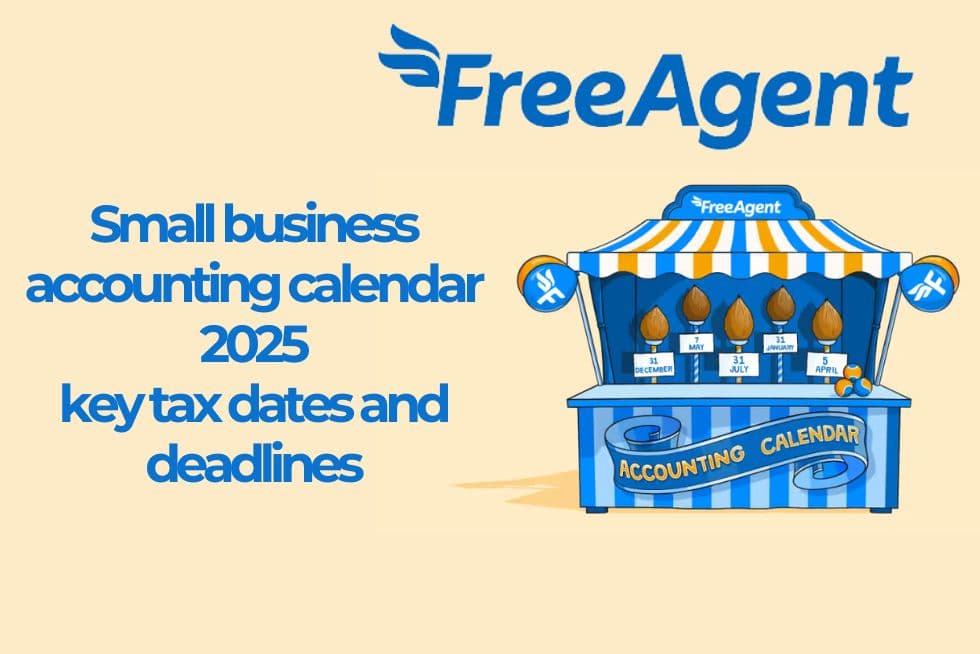
FreeAgent have put together some key dates to help you stay on top of your tax obligations throughout 2025.
As you get back into the swing of things in the new year, you might be wondering how to stay on top of your tax obligations throughout 2025.
To help put your mind at ease, FreeAgent have put together a timeline of the most important accounting dates for business owners and freelancers during the year - including a download link to easily add this to your own calendar. Some businesses may have additional deadlines to track as well, like quarterly VAT returns or payments on account.
We’d also strongly recommend staying up to date with the latest developments in the government’s rollout of Making Tax Digital for Income Tax (MTD for Income Tax). Instead of sending a Self Assessment tax return to HMRC once a year, MTD for Income Tax will see businesses submit four quarterly updates about their business income and expenses. At the end of the tax year, they will also have to send a final declaration. Self-employed business owners and landlords with a total business or property income (not profit) above £50,000 per year will move to the new system from 6th April 2026. Find out how MTD affects you and check the timeline for all the upcoming changes.
Here’s how an average tax year for a UK-based small business might look. It’s important to bear in mind that the tax deadlines you have for your own business are unique to your circumstances, and your obligations to HMRC will depend on many factors. These include whether you have any employees or if you’re running your business as a ‘side hustle’ while in full-time employment.
For extra clarity on your tax obligations, we recommend working with an accountant if you’re not doing so already.
1st - Corporation Tax payment deadline (if you have a limited company with an accounting year end of 31st March 2024)
31st - Self Assessment filing deadline for 2023/24 online tax returns
31st - Deadline for any remaining tax you owe for the 2023/24 tax year (known as a balancing payment) as well as your first payment on account for 2024/25’s Income Tax and National Insurance
31st - Corporation Tax return filing deadline for most limited companies with an accounting year end of 31st March 2024
1st - New financial year for limited companies, when most updates to Corporation Tax rates, etc come into play
6th - New tax year! The Chancellor’s planned updates to any tax rates, wage rates and minimum pension contributions (among other things) for individuals and unincorporated businesses will come into effect today
31st - Deadline for issuing any employees with their annual P60s covering 2024/25
6th - Deadline for filing P11D and P11D(b) forms (if applicable)
19th - Deadline for paying Class 1A National Insurance Contributions non-electronically (you’ll only pay this on benefits you give to your employees, such as private medical insurance)
22nd - Deadline for paying Class 1A National Insurance Contributions electronically
31st - Second Income Tax and National Insurance payment on account deadline
31st - Deadline for filing 2024/25 Self Assessment paper tax return (for those not filing online)
31st - Deadline for filing most limited companies’ annual accounts for the year ended 31st March 2025
If less than 80% of your income is paid at source and your tax bill is over £1,000, you’ll need to make payments on account. These are advance payments on your next year’s Self Assessment tax bill. Your payments on account are calculated by dividing the amount of Income Tax and Class 4 National Insurance from your most recent Self Assessment tax return bill by two. You need to make the first payment by 31st January and the second payment by 31st July.
The vast majority of small businesses will file a VAT return four times a year. Making Tax Digital (MTD) for VAT legislation requires all VAT-registered businesses to do this through MTD-compatible software like FreeAgent. The most common set of quarterly VAT return dates is:
1st January - 31st March
1st April - 30th June
1st July - 30th September
1st October - 31st December
Each VAT return is due for filing one month and seven days after the end of one of these quarterly periods. So for example, the VAT return that covers 1st January - 31st March needs to be filed to HMRC by 7th May.
Do you want reminders of every important tax date? Download our free accounting calendar, ready to import to your favourite calendar app.
If you use FreeAgent, you’ll notice that the deadlines that apply to you appear in the Tax Timeline on your Overview screen.
Latest news, events, and updates on all things App related, plus useful advice on App advisory - so you know you are ahead of the game.